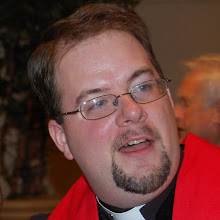
In
"The Goal of Twitter's New Homepage?" the social media gurus at
Mashable suggest that Twitter is expanding their horizons: rather than being a network all about you, what you're doing, what your friends are doing, and what
BTW, my standard defense of Twitter is that it is a place to engage real people and their ideas. Twitter puts a human face on events like The Episcopal Church's
General Convention, on corporate behemoths like
Southwest Airlines and
Starbucks, and engages in inventive pastoral care and liturgical expression: look at
@TheUrbanAbbey @butterflybeacon @twiturgies and others. I read people's blogs, laugh at their pictures, read news stories and commentary they find interesting or challenging, and often enter into a conversation that responds to John Wesley's question: "How is it with your soul?"
I have a longer thought developing about why Twitter is really useful, but Mashable's take on Twitter's new
homepage reflects good ecclesiological practice as well. We ought to be moving away from an exclusively individual-centered church towards one which is attentive to a broader mssion field:
Emphasizing that Twitter is the world’s platform for realtime information, for being connected to the entire world, is a savvy move on the part of Twitter....Branding Twitter as the one place where you are plugged in to the collective world makes it tougher to ignore. You can say “I don’t feel like updating people on my life,” but it’s far tougher to say “I don’t care about what’s happening in the world.”
What would it take for the church to say, "I don't feel like catering to the worries in my own life...I care about mending the world!" ? This shift in emphasis means not just a re-branding move, like changing from the SciFi channel to
SyFy, but making an enormous culture shift. It means moving past the toddler "me me me" stage to the point where we mature into the body of Christ building one another up so that we may all come to the fullness of faith and full stature of Christ (cf Ephesians 4).
What kind of faith do we inculcate? Are we just asking, "How are you doing?" Or are we caring about what's happening in God's world?





